Honor Magicbook 14 Notebook Review: Where Style Paints a Picasso
by Dr. Ian Cutress on May 15, 2020 9:00 AM EST- Posted in
- Laptops
- AMD
- Notebooks
- Zen
- honor
- Picasso
- MagicBook
- Magicbook 14
- Ryzen 5 3500U
Battery, Display, and Storage
Battery
One of the key differentiators with AMD’s newer Renoir mobile processor line is the better battery life. The battery life of devices using AMD’s Picasso mobile processors, as used here in the Honor Magicbook, has depended a lot on the implementation as well as the components of the system being used. The OEM has to be able to set up the system to get to idle quickly, and remain there. Nonetheless, the idle power consumption also needs to be low, not only for the CPU, but for the system, which means using efficient LCD panels where possible, and efficient controllers.
Honor claims that the Magicbook 14, with its 56 Wh battery, should be good for 9-10 hours of web/movie/office work, although this value is when the display is at 150 nits using MobileMark2014. For our test, as with our other laptops, we put the display at a more user-friendly 200 nits and run our web-app based light workload.
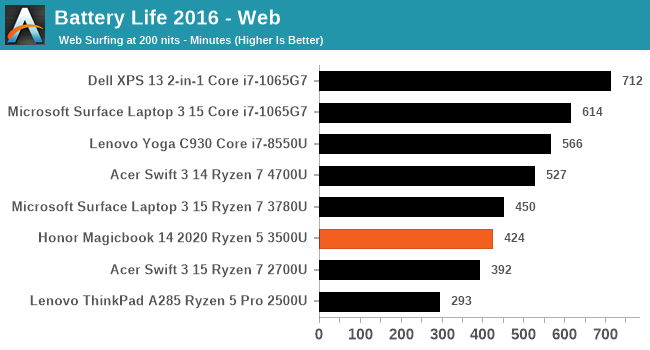
The Honor Magicbook 14 lasts 7 hours and 4 minutes in our test, or 424 minutes. This puts it ahead of the first gen Ryzen 2000 APUs, but behind the newer Ryzen 4000 APUs. The battery life of the Ryzen 7 in the Microsoft Surface Laptop with the same generation processor is quite near, however as we can see they are all a bit below what the intel systems can provide.
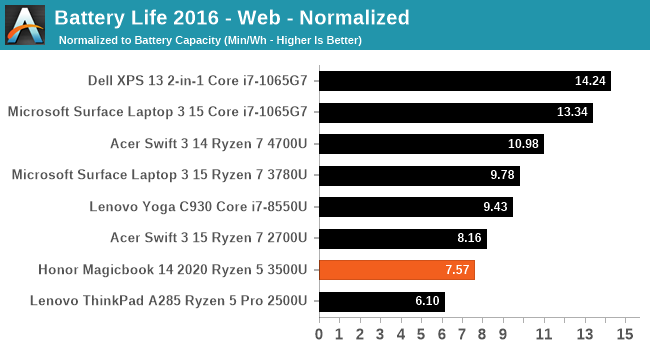
If we normalize for the battery capacity, then we are a bit further behind the AMD-based Surface Laptop than intended, and even behind the Acer Swift 3 with the Ryzen 7 2000 series.
Display
Inside the Honor Magicbook is a 1920x1080 non-touch LCD display, with ~5mm bezels. The webcam for the laptop is not in the display frame, but in a pop-up key between the F6 and F7 keys. Personally I’m not a fan of this webcam, because it means all you get is nose shots when using it on calls. However based on customer feedback, Honor (and Huawei, who use the same idea) says that their customers prefer having one there rather than not having one at all, like on the ASUS Zephyrus G14.
For the display, we measured a peak brightness of 240 nits, which is actually really low. Honor does not list an official brightness for the screen, but we suspect around ~250 nits, and this is perhaps one of the areas that helps bring the cost of the system down to $560. For color accuracy, with the system as shipped, it was not good at all:
After we applied a color calibration tool, the end result was almost ideal:
Storage
One of the highlights on this system is that Honor only have SSD options – not only that, they are Samsung NVMe PCIe 3.0 x4 SSDs. Someone at Honor is smart, and this helps the system in a lot of user responsiveness type scenarios. I had no issues.
The drive is the Samsung MZVLB256HAHQ, which translates as the PM981 with the Phoenix controller and Samsung TLC NAND. The drive is rated at 2.8 GB/s read and 1.1 GB/s write, but we achieved 3.6 GB/s read and 1.6 GB/s write, a substantial gain. This drive over at Amazon is $64, representing more than 10% of the cost of this system.


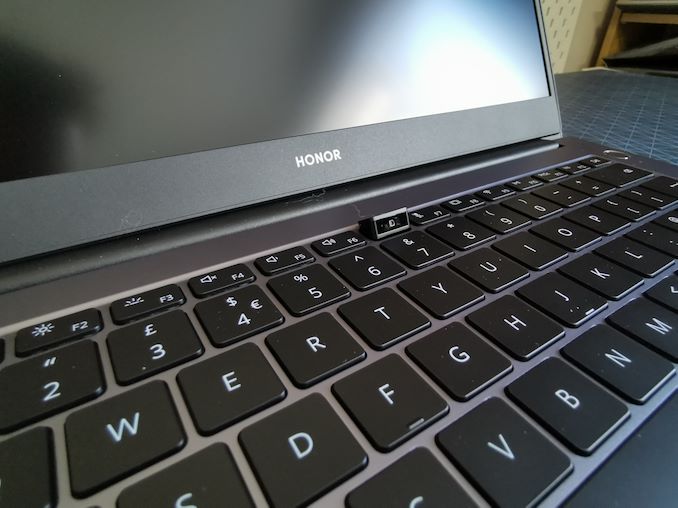

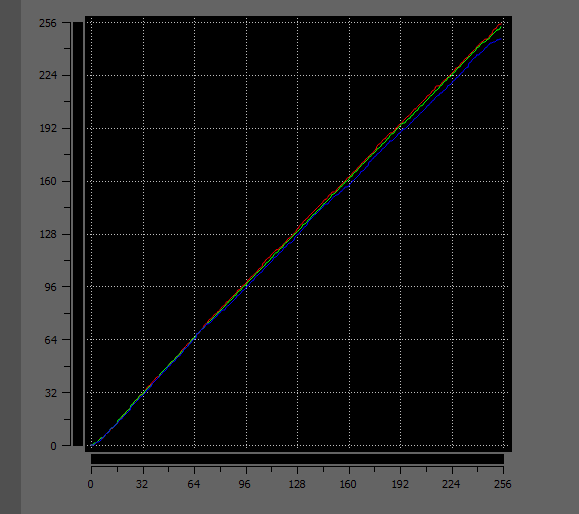
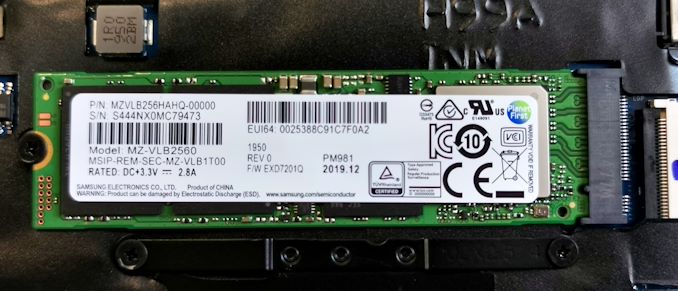
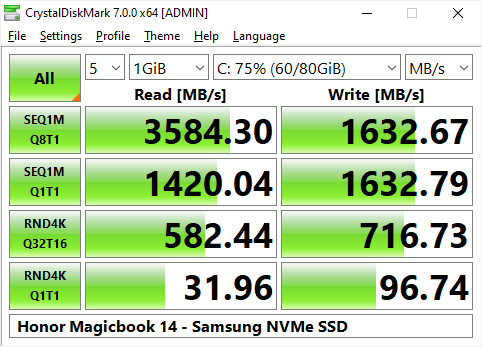








88 Comments
View All Comments
Sailor23M - Sunday, May 17, 2020 - link
Aa ha ha lov thisConnieD - Monday, June 8, 2020 - link
I agree. Wumaos out in full force.sonny73n - Saturday, May 16, 2020 - link
Go back to cnn. Stop spreading fake news here.Ithaqua - Sunday, May 17, 2020 - link
@sonny73n : I think you mean Fox "not really" News. CNN at least tries to to get some facts correct. Though Fox is more fun, knowing that they are on par with The Onion; and people think it's a real news network, not just a scam to mess with people.sonny73n - Saturday, May 16, 2020 - link
Nobody would believe your BS anymore. You’re helping your mafia government to slander competitors in order to eliminate competitions and kill free market. You’ve reached new low. How can you keep on living as a subhuman?Manofwind - Saturday, May 16, 2020 - link
When huawei's 5G equipment shipped to market, Qalcomm's 5G was still a plan then. You tell me, where to steal the 5G IP at that time?Ithaqua - Sunday, May 17, 2020 - link
@sharath.naik: Replace China with USA and communist with crippled democracy / kleptocracy and your statement still fits.There is no true free market in the world. Every country has rules to help themselves and protect those who give them money. US companies steal as well (just less obviously) and key industries are funded (in full or in part) directly and indirectly by government funds.
The "developed" world's patent & IP rules are a joke (hey Apple I'm looking at you) that either gets bent by money or abused by people who don't want to loose money. In theory it should be for the good of the citizens of the country and to help encourage R&D, not to abuse management bonuses and to stifle competition.
China is just more obvious about their abuse, since they plan things out instead of going by quarterly profit announcements. They know what to hide and what will blow over in 4/8 years.
Valantar - Monday, May 18, 2020 - link
"Free market" is an oxymoron. Markets are competitive, and tend towards monopolization if left unregulated (what's the best way of ensuring your survival if you're a leading company in a market? Buying out the competition or forcing them into bankruptcy.). Thus free-as-in-leave-me-alone markets are an illusion and become unfree as soon as someone gains enough power to exert in on others. (And don't come dragging that "market disruption" nonsense - we all know that doesn't work.) The closest one can come to a "free" (as in: fair and equal opportunity) market is a strictly regulated one.But ultimately, all market economics are based on the absurd idea that infinite growth is possible, and are based on a spiralling system of credits and debts. After all, debts have interest, so you need to bring in more money than you have borrowed. Where does that money come from? Other people's debts! So they need to do the same. If it worked it would be an oroborous, but this is just a spiral consisting of ever increasing debts and ever more precarious lives, where everyone but the super-rich lose in the end. This is not a system that is built to exist long term, and dramatic crashes are a fundamental part of it that cannot be avoided or even effectively alleviated.
Spunjji - Monday, May 18, 2020 - link
@Valantar - this is probably the best short-form summary of the paradox of the "free market" I've seen in a while. Nicely put!yannigr2 - Saturday, May 16, 2020 - link
The whole story is to prevent Huawei to become the next Apple+Samsung combined. Huawei is not considered, yet, a threat in the laptop market to US companies. A Huawei that could threaten Dell and HP, wouldn't be able to buy even a first gen i7 or an AMD Bulldozer CPU, not Renoir and latest gen Intel CPUs.